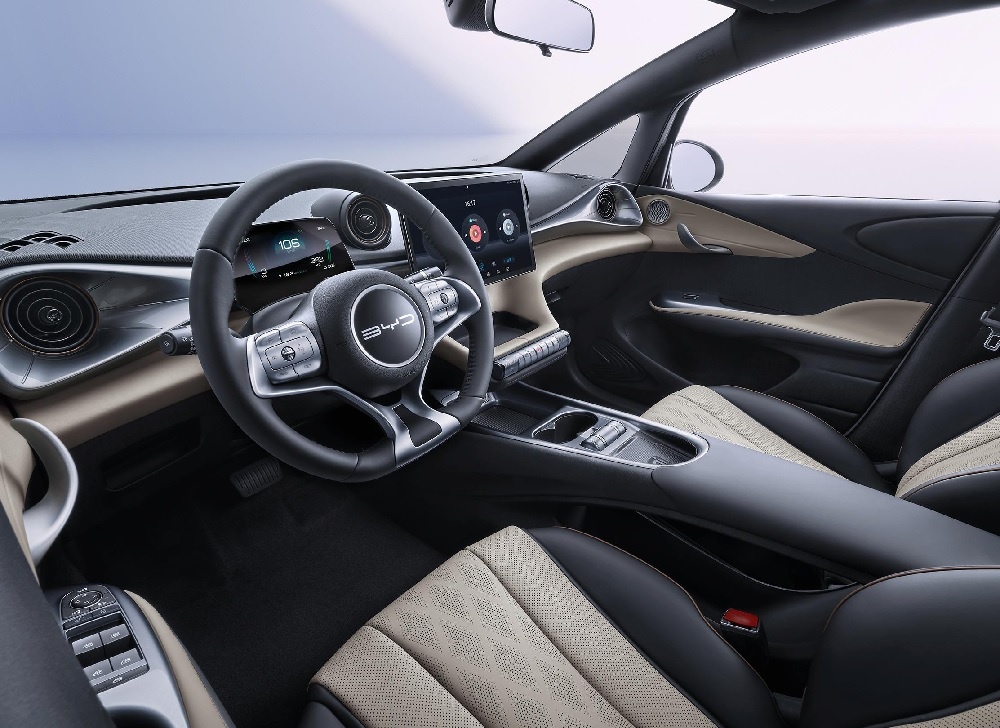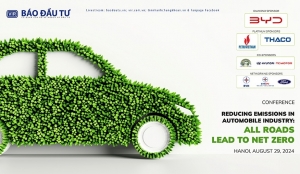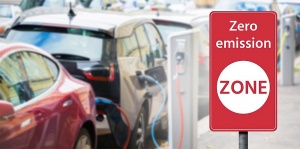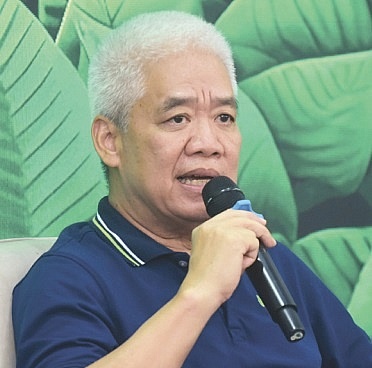Pointed pivot can ensure EV success
Vietnam is poised for significant growth in the electric vehicle (EV) sector, leveraging a large domestic market and access to rare earth resources essential for battery production. However, realising this potential hinges on comprehensive long-term strategies that address both environmental goals and the development of a robust mechanical engineering industry to support transportation, logistics, and defence.
 |
| Pointed pivot can ensure EV success, Photo BYD Vietnam |
That was according to expert speakers at last week’s conference on reducing emissions in the automotive industry held by VIR.
One of the critical obstacles in advancing EV development in Vietnam, however, is securing the necessary capital. Economist Dr. Le Xuan Nghia highlighted this challenge at the conference.
“The biggest hurdle is securing the required capital, which demands hundreds of millions, even billions, of US dollars in low-interest, long-term loans,” he said. “The issue is further complicated by Vietnam’s fragmented banking system, where small banks primarily focus on real estate lending. This has driven up interest rates, making it difficult for other industries, particularly mechanical engineering, to grow and support EV technology and emission reduction efforts.”
On the other hand, under Vietnam’s current Law on Special Consumption Tax, hybrid vehicles using a mix of petrol and electric power, where petrol accounts for no more than 70 per cent of total energy consumption, are taxed at 70 per cent of the rate applied to comparable internal combustion engine vehicles.
The Ministry of Finance believes this incentivises the adoption of environmentally friendly vehicles. However, to avoid confusion with hybrid e-vehicles (HEVs) that primarily run on petrol, the ministry proposes that only plug-in hybrid e-vehicles (PHEVs), which can be charged externally, should qualify for the reduced tax rate. As a result, HEVs would be taxed at the full rate applicable to gasoline-powered vehicles.
Nguyen Ngoc Thai, director of Tax and Business Support Services at KPMG Tax and Advisory, pointed out that several countries have implemented preferential excise tax policies for PHEVs and HEVs. For example, Thailand offers a tax rate that is 17-27 per cent lower than that for internal combustion engine vehicles, while Indonesia provides reductions ranging from 8-40 per cent, he noted.
“As a result, Thailand saw an 86 per cent increase in PHEV and HEV sales in 2022, with their market share rising from 2 per cent in 2018 to 15 per cent in 2023. In Indonesia, sales of energy-efficient vehicles have been growing at an annual rate of 22 per cent,” Thai added.
He also mentioned China’s policies of subsidies and VAT exemptions, which have driven a 38 per cent increase in EVs sales in 2023, while Japan’s tax incentives led to HEVs capturing 40 per cent of the market in 2022, surpassing traditional vehicles, and PHEV sales doubling to 37,000 units.
The Vietnam Automobile Manufacturers Association (VAMA) has calculated that applying preferential excise tax rates – 50 per cent for PHEVs and 70 per cent for HEVs - would result in a short-term decrease in state budget revenues. However, the impact would be minimal.
“In return, Vietnam could reduce fuel consumption by over one million litres annually, equivalent to approximately $1.08 billion, and lower the need for crude oil imports by more than 14 million barrels, saving roughly $1.16 billion,” said the VAMA.
These tax incentives would also make PHEVs and HEVs more affordable, contributing to a reduction of over 2.6 million tonnes of CO2 emissions. This aligns with the government’s carbon reduction goals in the transport sector and helps mitigate air pollution, particularly in major cities like Hanoi and Ho Chi Minh City.
Furthermore, Vietnam is currently reforming its tax policies to shift from direct to indirect taxation.
Nguyen Van Phung, former director of the Department of Tax Administration for Large Enterprises at the General Department of Taxation, explained that VAT and excise tax - both indirect taxes levied on consumers through businesses - are being adjusted upward, following global trends to balance revenue losses from other tax cuts.
“To raise the family deduction threshold, increase the taxable revenue threshold, and indirectly lower corporate income tax to boost investment, indirect taxes must be raised to ensure sufficient revenue,” Phung said.
However, he cautioned that any increase in taxes must be carefully calculated. “The objective should be to encourage investment and nurture revenue sources for stable, long-term growth in state budget revenues. If tax policies aren’t adjusted properly, the state budget could see a decline rather than an increase in revenue,” he said.
Meanwhile, Bui Ngoc Bao, who is chairman of the Vietnam Petroleum Association, expressed concerns about the lack of specific regulations and policies for EV development.
“Without clear policies today, significant progress by 2030 seems doubtful,” he stated. “We’ve had a detailed plan in the past, but implementation has been challenging.”
He also raised concerns about the energy demands of EVs, noting that these needs are not addressed in the Power Development Plan VIII. “Without integrating EV requirements into our national power strategy, the shift to EVs seems unlikely,” Bao cautioned.
| Ha Quang Anh, director, Centre for Ozone Protection and Low Carbon Economic Development Centre, Ministry of Natural Resources and Environment
Net-zero is about balancing development and the environment, not ceasing emissions entirely, but equalising emissions and absorption to reach zero. This requires enhancing greenhouse gas (GHG) absorption, such as through forests, and reducing emissions. Globally, transportation contributes six billion tonnes of CO2 annually. By 2030, Vietnam is projected to emit 89 million tonnes of CO2 from transportation. The prime minister’s commitment has mobilised the entire political system since 2021, resulting in numerous legal guidelines. The responsibility now lies with communities and businesses to implement regulations, though many are not yet fully prepared. The Ministry of Natural Resources and Environment has been raising awareness to transform understanding into action. The primary challenges are awareness and finance. Businesses need to modify various aspects, especially production technology, which requires financial resources. Balancing company growth with environmental investments is crucial. There is a shortage of human resources for emission reduction and climate change mitigation, with most local officials handling these tasks as additional duties. Businesses face similar issues, with environmental departments often being understaffed. Recent decrees and decisions have left businesses uncertain about implementation, despite guidance from some ministries. Advantages include the engagement of the entire political system and Vietnam’s experience with climate change impacts. The country has significant potential for developing green vehicles. Nguyen Huu Tien, deputy director general Department of Science, Technology, and Environment Ministry of Transport
The Ministry of Transport has developed a detailed implementation plan, from reviewing legal regulations to executing specific measures. In a short period, we have issued regulations that allow green transportation vehicles to operate smoothly on the roads, while also encouraging the development of electric vehicles (EVs). In the first eight months of 2024, we have assembled and imported 68,000 EVs. This is an impressive figure. Localities like Hanoi and Ho Chi Minh City plan to use electric buses next year and are working on a roadmap to phase out vehicles using fossil fuels. Additionally, we are also studying and proposing the use of carbon credits in the process of transitioning to green vehicles. This is a solution that could help alleviate the financial burden on businesses and citizens, while also encouraging the shift to environmentally friendly transportation. In recent years, we have implemented many important incentive policies. An excise tax on EVs was introduced into law in 2021, with incentives extended until 2027. Moreover, registration fees have also been adjusted to facilitate the development of EVs. In terms of investment, high-tech sectors such as batteries and charging stations have been included in the list of investment incentives. Bui Ngoc Bao, president, Vietnam Petroleum Association
Currently, the Vietnamese market has about 60 million motorcycles and over five million cars, mainly using petrol and diesel. In my opinion, the vision for 2030 to transition to 10 per cent EVs is already a high proportion. The issues of fossil fuels and emissions raised today are also to review and prepare for future problems. If we do not have specific regulations and policies by now, the issues raised at present will still be unresolved by 2030. In 2011, Vietnam issued a roadmap to apply Euro 4 emission standards by 2017 and Euro 5 standards by 2022. We also have specific regulations on SCTs for E5 and E10 petrol and on the selling prices of these items. However, to date, many issues remain unresolved. Moreover, electricity is a state-regulated commodity, so without policies, implementing the vision for 2030 and meeting fuel requirements for vehicles on schedule will be very difficult. Transition is very costly, so to ensure the achievement of goals, two things need to be firmly grasped: consumer demand and policies to promote behaviour. The automotive industry has sent strong messages aimed at vehicle owners, stating that if owners do not use the right type of fuel, their vehicles will not be warranted. In addition, fuel supply businesses will have to ensure they meet customer needs for eco-friendly vehicles and fuels. The fuel transition process depends heavily on consumer awareness. There is a good point for the Vietnamese car market; as cars are considered personal assets, owners’ awareness of investment and asset protection is superb. The remaining issue is the need to provide information to users about suitable fuels that ensure emission reduction for their chosen vehicle line. This will contribute to developing a fuel supply system that both ensures emission reduction and meets technical requirements. DR.Le Xuan Nghia, president Consultancy on Development Institute
In terms of fostering vehicle consumption with the goal of further reducing GHG emissions, there are several key issues to address. Firstly, in terms of communication, manufacturing companies have yet to achieve effective outreach, and their messaging has not successfully reached consumers. Rather than requiring detailed information on macro policies, people are primarily concerned with practical issues, such as the reliability of EVs in adverse weather and potential fire hazards. To be effective, communication strategies must address these specific concerns. Individual consumers prioritise safety over price, while the broader community is primarily focused on air quality. This brings us to the second motivation, the reduction of GHG emissions. Climate pollution is a critical issue, with current pollution levels being alarmingly high globally, including in Vietnam. Recently, the South Korean government proposed a programme to assist Vietnam in setting up carbon liquefaction stations for export in exchange for carbon credits. However, it became apparent that Vietnam’s policies had deficiencies, resulting in cancellation. Consequently, policy reforms are needed to better align with contemporary realities and advancements, especially in the new energy vehicle sector. The third motivation is consumer safety. Consumers prioritise product safety above all, followed by convenience, and then price. It is essential for the government to support Vietnamese businesses and citizens on both all aspects of the effort to cut GHG emissions. Tran Thi Bich Ngoc, head, Department of Administration Supervision on Tax, Fees, and Charges, Ministry of Finance
The Ministry of Finance has submitted a draft of the Law on Special Consumption Tax (SCT) to the government and National Assembly. Under this, the SCT rate for EVs will be significantly lower, about 1-3 per cent until March 2027, after which it will rise to 4-7 per cent. In contrast, fossil fuel-powered vehicles will be subject to a SCT rate of 35-150 per cent, depending on the vehicle type. The ministry has proposed and issued a decree, offering high registration fee incentives for EVs, such as a three-year exemption from registration fees, followed by a 50 per cent reduction for the next two years. Meanwhile, fossil fuel-powered vehicles are subject to a registration fee of 10-12 per cent. For batteries, a list of high-tech industries prioritised for investment and high-tech products, including fuel cells and lithium batteries with high performance, large capacity, long lifespan, safety, and environmental friendliness, has been issued. All applicable taxes are currently set at the highest preferential rates. Hybrids also receive significant incentives, though not as high as for EVs. The law currently imposes a tax rate of 70 per cent compared to fossil fuel-powered vehicles of the same type. For vehicles running on biofuels, the rate is only half of that applied to petrol-powered vehicles of the same type. Regarding environmental protection tax, it only applies to petrol, oil, and grease derived from fossil sources, and not to those made from biofuels. Also, we will consider registration fees for battery-EVs. Tran Anh Thai, CEO, ATS JSC
According to some organisations, if EVs account for 25 per cent of vehicles on the road, the load on the power system will increase by 50 per cent. By 2035, the number of EVs will increase by about 12 times compared to now. Therefore, transport electrification needs to be included in the national plan, enabling the power sector to invest in infrastructure and create a basis for development. Additionally, charging stations for EVs connected to the distribution power system may create adverse effects on the existing system, such as increasing power capacity, overloading transmission lines and transformers, and affecting power quality. As EV chargers are power electronic sources different from previous power supplies, the proliferation of charging stations will affect the stability of the power system. Vietnam needs comprehensive regulations before the boom in operation of EV charging stations, including technical regulations on monitoring and control capabilities for stations to reduce the impact when connecting to the system. Furthermore, since the number of connection points is limited, charging stations when established must be usable for all types of vehicles, avoiding monopoly situations. Moreover, there should be common standards for payment and transparency. |
 | Supporting a green strategy for the automotive industry With 6.5 million cars and 74 million motorcycles, Vietnam is the second-largest emitter of greenhouse gases (GHGs) from road transport in Southeast Asia, following Indonesia. Emissions from road vehicles in the country are rising rapidly, with an average annual increase of about 15 per cent over the past decade. |
 | EV strategy must prioritise keeping the pace globally Under Vietnam’s vehicle industry development strategy, electric vehicles (EVs) require robust support from government policies to contribute effectively to the country’s net-zero commitment. |
 | Tech players take on EV charging infrastructure Electric vehicle charging station companies are looking for more incentives to facilitate their expansion in the Vietnamese market. |
 | Proposals looked at to change registration fees for certain EVs The Ministry of Finance has proposed a decree that offers high registration fee incentives for electric vehicles (EVs), such as a 3-year exemption from registration fees, followed by a 50 per cent reduction for the next two years. |
What the stars mean:
★ Poor ★ ★ Promising ★★★ Good ★★★★ Very good ★★★★★ Exceptional
Related Contents
Latest News
More News
- Citi economists project robust Vietnam economic growth in 2026 (February 14, 2026 | 18:00)
- Sustaining high growth must be balanced in stable manner (February 14, 2026 | 09:00)
- From 5G to 6G: how AI is shaping Vietnam’s path to digital leadership (February 13, 2026 | 10:59)
- Cooperation must align with Vietnam’s long-term ambitions (February 13, 2026 | 09:00)
- Need-to-know aspects ahead of AI law (February 13, 2026 | 08:00)
- Legalities to early operations for Vietnam’s IFC (February 11, 2026 | 12:17)
- Foreign-language trademarks gain traction in Vietnam (February 06, 2026 | 09:26)
- Offshore structuring and the Singapore holding route (February 02, 2026 | 10:39)
- Vietnam enters new development era: Russian scholar (January 25, 2026 | 10:08)
- 14th National Party Congress marks new era, expands Vietnam’s global role: Australian scholar (January 25, 2026 | 09:54)







 Tag:
Tag:



















 Mobile Version
Mobile Version